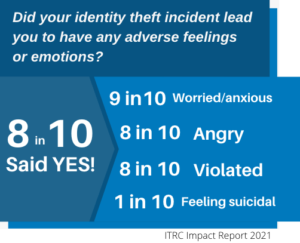Identity theft is a growing problem that affects millions of people every year. It can be a devastating experience that leaves victims feeling stressed, vulnerable, and emotionally drained. In this article, we will explore the lasting impact and emotional toll of identity theft, including the stressors, frequency, and psychological effects of this crime.
Identity Theft Epidemic
Identity theft is a crime that occurs when someone steals another person’s personal information, such as their Social Security number, credit card number, or bank account information. This stolen information is then used to commit fraud or other illegal activities.
According to the Federal Trade Commission, identity theft is the most common type of consumer fraud in the United States. Investment scams caused the largest financial losses in 2022, totaling over $3.8 billion, which is more than twice the amount lost in the previous year. The second highest category of reported losses came from imposter scams, which resulted in losses of $2.6 billion, up from $2.4 billion in 2021.
Stressors: Financial and Emotional Stress Ranging from Anxiety to Emotional Volatility
Identity theft can have both financial and emotional consequences. Victims often experience a range of stressors, including anxiety, emotional volatility, and financial strain. Financial stress is perhaps the most obvious consequence, as victims may face financial losses due to fraudulent activity on their accounts.
Emotionally, victims may feel violated, angry, or helpless. Identity theft can shake a person’s sense of security and trust, leaving them feeling vulnerable and exposed.
Identity Theft
It is a pervasive problem, affecting millions of people every year. It can happen to anyone, regardless of age, income, or background. Criminals often use a variety of tactics to steal personal information, including phishing scams, data breaches, and skimming devices.
Psychological Effects of Identity Theft
The psychological effects of identity theft can be significant and long-lasting. Victims often experience reactions similar to those of trauma victims, including emotional distress, anxiety, and grief. They may feel violated and powerless, experiencing a loss of confidence in areas where they typically had confidence.
Some of the common psychological effects of identity theft include:
- Feeling Vulnerable: Identity theft can leave victims feeling vulnerable and exposed. They may feel like they have lost control over their personal information, which can be a difficult feeling to shake. This sense of vulnerability can impact a person’s sense of self and their relationships with others.
- Self-Blame: Victims of identity theft may also blame themselves for the crime, even though it is not their fault. They may feel like they should have done more to protect their personal information, or that they somehow caused the theft to occur.
- Feeling Isolated: Identity theft can be a lonely experience, leaving victims feeling isolated and alone. They may feel like no one understands what they are going through, or that they are somehow to blame for the crime.
- Family Problems: Being a victim impact a person’s relationships with their family members. They may feel like they have let their loved ones down, or that they are a burden on their family. This can strain relationships and cause tension in the home.
- Work Problems: It can also impact a person’s job and career. Victims may need to take time off work to deal with the aftermath of the crime, or they may struggle to focus on their work due to the emotional toll of the experience. This can lead to missed opportunities, reduced productivity, and strained relationships with colleagues.
Identity theft can have a lasting impact on victims, both financially and emotionally. The psychological effects of this crime can be significant, causing emotional distress, anxiety, and grief. Victims may feel vulnerable, isolated, and alone.
Related articles:
- Realities of Identity Theft
- Financial Wellness in the Workplace
- What is Employee Criminal Identity Theft?
